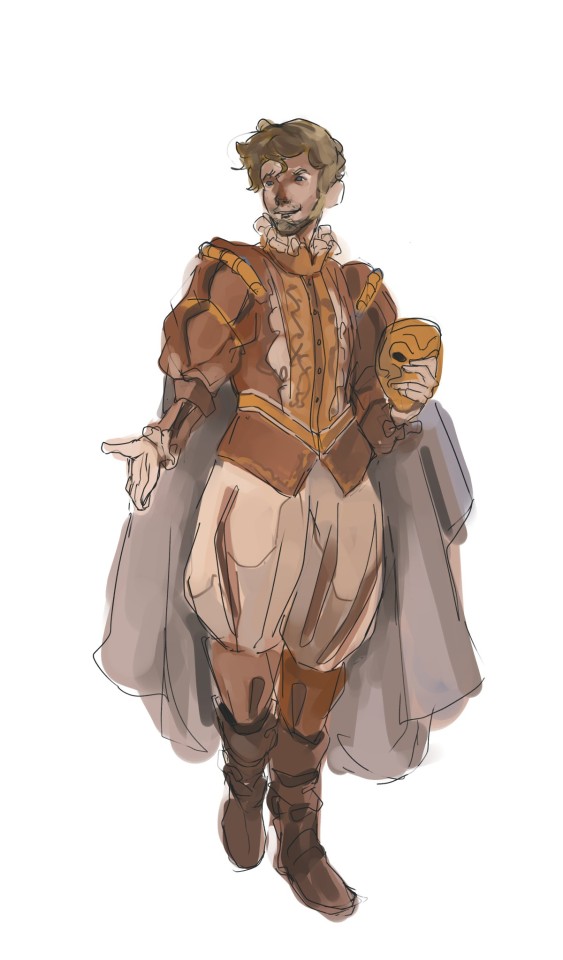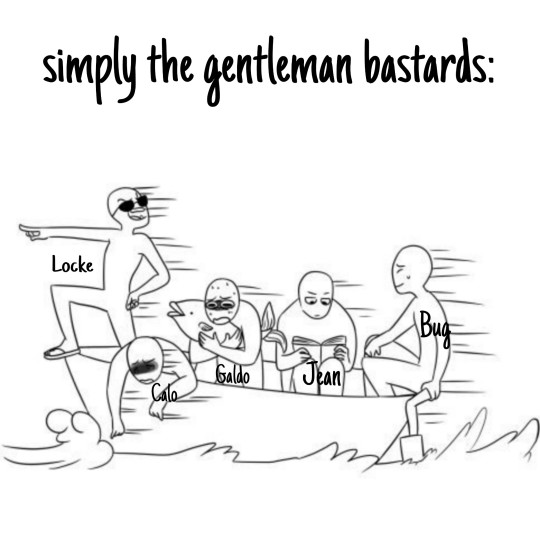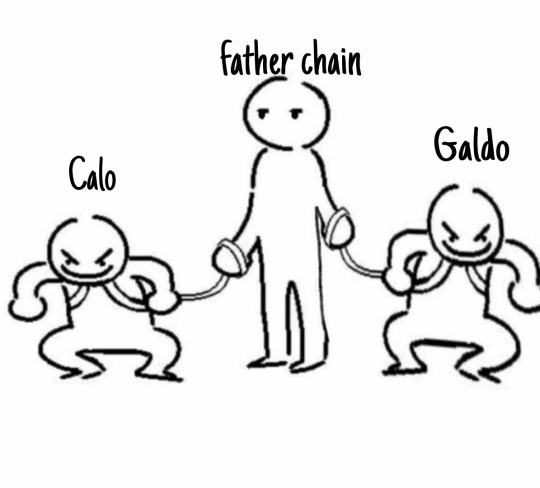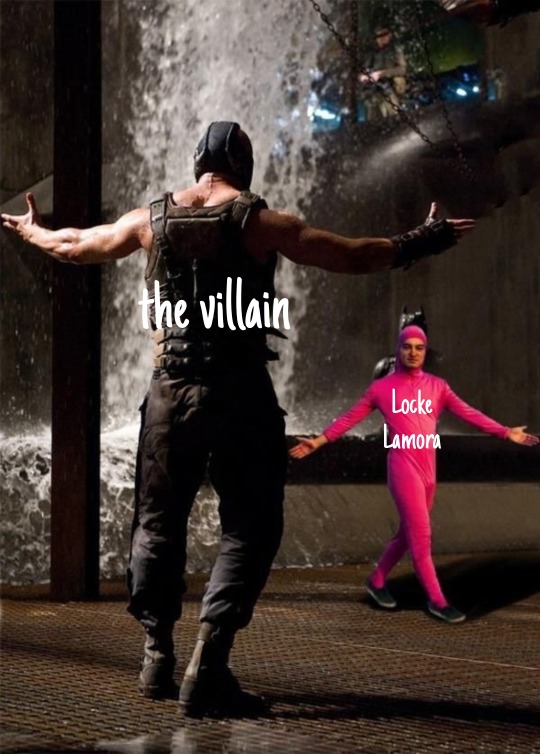#gentleman bastards
Text
*in a series that has previously all been written by one person
#kingkiller chronicle#asoiaf#gentleman bastards#pegasus#the name of the wind#the lies of locke lamora#game of thrones#ive only read one of the big three series so to speak#and pegasus my beloved#no one else cares but i do
93 notes
·
View notes
Text
gentleman bastards among us game would go crazy. Locke Lamora you would have loved among us
86 notes
·
View notes
Text

I was trying to sketch locke lamora but WHYY does he feel like Taryon Darlington instead.. ahhh xD maybe Locke's just cosplaying Tary to con Vox Machina
#locke lamora#gentleman bastards#the gentleman bastards#camorr#the lies of locke lamora#dnd artist#dnd character#dnd art#dnd stuff#art#commisions open#critical role#digital commisions#drawing commissions open#critical role fanart#taryon darrington
158 notes
·
View notes
Text
Just finished the prologue for The Lies of Locke Lamora, which I don't know the premise of because I picked up the book on a recommendation from a stranger without reading the jacket blurb, and damn. I know I'm reading the fully edited version, but this must be what agents and editors are taking about when they say they can tell if a book is good in a single page. The writing is so good that I was excited to be along for the ride, whatever the heck that is, before I even got a vague sense for how enjoyable the characters are.
65 notes
·
View notes
Text
I'm counting LotR as just one book so it's not here and I only read one ASOIAF book so it can't enter this.
#booklr#fantasy book series#rote#discworld#nightrunner series#the first law#the poppy war trilogy#shades of magic#his dark materials#gentleman bastards#the chronicles of prydain#sevenwaters#the title is a joke these are only series I read ahah#I am putting broken earth in the scifi poll#my polls
126 notes
·
View notes
Text

some fantasy characters!
#myart#cosmere#the stormlight archive#stormlight archive#kaladin stormblessed#sylpherena#tlt#the locked tomb#gideon nav#gideon the ninth#locke lamora#gentleman bastards#the lies of locke lamora#someone help kaladin#he got stuck with the troublemakers#cosmere fanart#tlt fanart
27 notes
·
View notes
Text
Thinkin about that chapter in the Lies of Locke Lamora where Locke goes into that bank (?) THREE WHOLE TIMES in different disguises to try to con rich people out of their nice clothes
He’s such a theater kid why on earth was this the best strategy for getting a fancy suit I was losing my mind by the time he went back in for attempt #3
#gentleman bastards#the lies of locke lamora#and it WORKED (the third time)#and then the guy whose clothes he stole sees him WEARING SAID CLOTHES at the fancy party and has a crisis#like what would you even do#Locke is so fucking funny
148 notes
·
View notes
Text




The Lies of Locke Lamora, Scott Lynch
#things that make me a little bit crazy#reading log#gentleman bastards#the lies of locke lamora#locke lamora#jean tannen#q
212 notes
·
View notes
Text
#scott lynch#travis baldree#t kingfisher#gentleman bastards#legends and lattes#nettle and bone#round 1#polls#fantasy book tournament
133 notes
·
View notes
Text

jean tannen and locke lamora: evidence that the best duo dynamic is in fact big murder guy + tiny scheming guy
#artery art#the lies of locke lamora#book fanart#jean tannen#locke lamora#gentleman bastards#artists on tumblr
35 notes
·
View notes
Text
Locke Lamora ruined fantasy heist books for me.
#it takes me so much more to get into them now because the bar is just so high#the lies of locke lamora#gentleman bastards
31 notes
·
View notes
Text
I'm rereading the Lymond Chronicles right now and, as a lover of twisty, strategic bastards, I have to say that Dunnett understands things about how to write them properly that few others do. Everything that happens in these books lands in a very heavy, physical way - like, you can almost feel the physical thunk as events land, whereas most other twisty bastards books feel like floaty CGI whose physicality you're never really fully buying, fun as the special effects are.
So I tried to do a little analysis as to why, because I live for a twisty strategic bastard narrative :)
Lymond has a personality and is driven by his emotions, despite his cleverness and chessmaster tendencies - he doesn't do everything out of strategic consideration, and you can clearly see his fault lines from the start - glimpses of suppressed emotion, flaws that may be his undoing, irrational choices that clearly fulfill a psychological purpose but not a strategic one. Everyone is allowed to be pathetic and annoying and unlikeable. And all this is allowed to shape the plot - sometimes the character will be allowed emotions and a personality but not where it impacts the plot, so you will get a sort of a parallel lines thing where there's an "emotion" plot where the character is perhaps allowed to be flawed and show off their personality, and which perhaps impacts their interpersonal relationships, and a "competence" plot where the character always performs near-flawlessly and their emotions never enter into the game, and never the twain shall meet. No matter how controlled and self-possessed someone is, it strains my credulity when a person is portrayed as someone in possession of major personal flaws or psychological anguish, and yet this is never allowed to spill over into the way they interact with the "competence" plot or derail them in any way. Especially if they are portrayed as someone suppressing everything for efficiency's sake - they are going to crack at some point, and the stitches are going to burst open like a shaken bottle of soda with innards flying everywhere and hitting everyone around them, and if they're not, you're clearly not putting your character under enough pressure. Which makes for a boring story. The fact that Lymond is 100% human 100% of the time actually makes him look more competent and impressive, not less.
He is allowed to fail, because flaws are human and failure is human. The more convoluted a plan the more possible points of failure it has, and this is especially the case if large chunks of it rely on understanding and manipulating human beings: humans are messy complex dynamic systems, like the weather, and are therefore difficult if not impossible to predict to that degree of granularity. Lymond is allowed to misjudge Scott, for example, he is allowed to have his convoluted plans go wrong, and this is allowed to derail him: sometimes he bounces back, yes, but he is not constantly failing upwards, and his failures do have unfixable consequences sometimes. If they never did, the narrative would become boring and void of tension and emotion. The fact that the difficulty of pulling off these plans is realistically portrayed through the inclusion of stochasticity makes me admire his capacity to pull them off as often as he does more and not less.
He is allowed to fail in a way that's his own fault - combining my previous two points, it's not always that circumstances have conspired in such a way that he couldn't possibly predict or influence it; his failures are often a consequence of his own flaws and his own psychological hangups and blind spots, and are therefore all the more pleasing to read about because they tie into the emotional and personal narrative of the books. (Though I do also love the narratives where the brilliant hero does everything right and yet is trapped in a set of shifting wider historical circumstances where whatever he does is doomed to fail eventually, like Bel Riose from the Foundation books or even Thrawn.)
Another important point is when he's allowed to fail - I read somewhere that a deux ex machina or a similar contrivance that kick starts the plot is more tolerable and less suspension of disbelief-breaking than one which resolves it at the climax, and I think that it's kind of the opposite with failures of twisty bastards? So many people writing them seem to adore the competence porn too much to let them fail at crucial moments - if they do fail, even if it checks all my previous points, it's at the beginning, so that they are then allowed to use their cleverness twist out of the situation - see Eugenides in Return of the Thief, whose stubbornness and jealousy loses him the support of his foreign allies, but who then manages to pull through despite it (and is then vindicated by them never having had the intention to help in the first place due to realpolitik considerations). Or Miles Vorkosigan in Memory - he has a lapse of judgement at the start, but he makes no further lapses of judgement, and even his emotional journey of depression and reexamining of his life (the series' high point of characterization complexity tbh) has absolutely no bearing on his efficient functioning within the plot itself.
Which brings me to, consider also the role that this failure has in the narrative - because unless you're writing something that's just hardcore sociological storytelling (again, like the Foundation), this is a story about individuals, and a climax with personal stakes is almost always more satisfying than a more impersonal one where the hero gets to show off his cleverness. When Lymond fails in The Game of Kings, it swerves the plot from a very mechanistic, spy-novel-esque intrigue of finding the right man and clearing his name, to a psychodrama that forces him to confront his brother and face his past emotionally, and that also airs all of Lymond's flaws and misconceptions and pent-up emotions, but also all of Richard's, because this is the driving force of the narrative and it's so much more satisfying to watch it unfold than it would have been to watch Lymond bounce back and execute everything with flawless mechanical accuracy. Compare this to the climaxes of most new canon Thrawn books, or most Vorkosigan books (the one big exception is Brother in Arms - actually the more Mark the book has, the likelier it is to have an emotion-driven denouement), or all of the Inda books, or all of the Gentleman Bastards books - at best they will put a loved one in danger or kill them off to generate personal stakes, but what does Thrawn's personality, for example, have to do with the resolution of the plot in his books? I love those books, but they don't land nearly as hard. Compare and contrast Tyrion's trial in ASOIAF - Tyrion is also a twisty bastard but the process of him defending himself and running away doesn't involve his wits - it involves confronting his father and brother, about whom he has massive emotional baggage.
Anyway the TL;DR is you should all read the Lymond Chronicles.
#lymond chronicles#dorothy dunnett#mentions of:#vorkosigan saga#queen's thief#gentleman bastards#thrawn trilogy#foundation#asoiaf#writing#writing advice#I guess?
46 notes
·
View notes
Text
A thing I'm really enjoying about Gentleman Bastards: Locke is genuninely devout. He's a sham priest of Perilandro, but a true beliver in the 13th. He sacrifices things, feels compelled to do things which fuck up his plans, he makes life so much harder for himself because that's the will of his strange god.
There's religious characters in fiction all the time. But for the dashing rouge/charming conman character to have such strong religious convictions he outs himself as a theif in order to give a more honest funeral service is rare.
17 notes
·
View notes
Text
Just some Locke Lamora's meme ;D









#scott lynch#the lies of locke lamora#locke lamora#jean tannen#gentleman bastards#i finished the lies of locke lamora. still think it has some issues but i ended up really liking it despite that and am now readin book 2#the gentleman bastard sequence#red seas under red skies#the republic of thieves#sabetha belacoros#the sanza's twins#funny memes
156 notes
·
View notes
Text
I was here minding my own business and then I remembered Nazca :(
33 notes
·
View notes
Text
I think it's funny that in the 10th anniversary of The Lies of Locke Lamora, Scott admits that it has flaws and wasn't the perfect debut every author wants but. like. I've read that book multiple times in the past year and I have yet to admit that it has any flaws. It's perfect. You can't change my mind.
47 notes
·
View notes